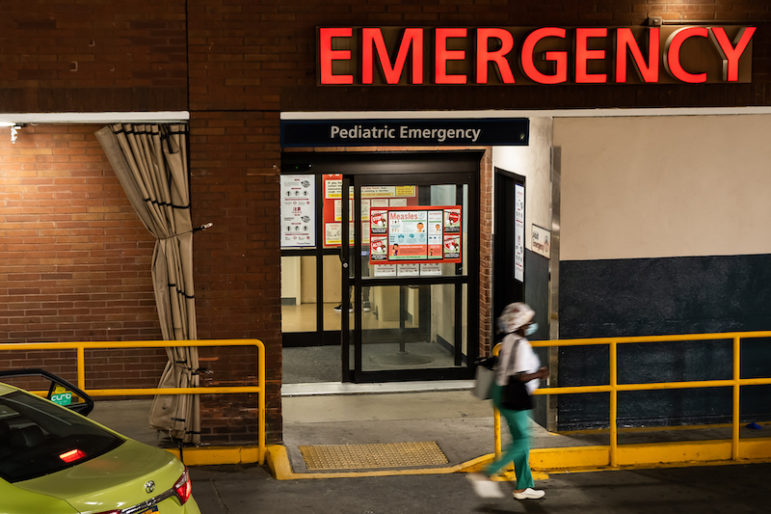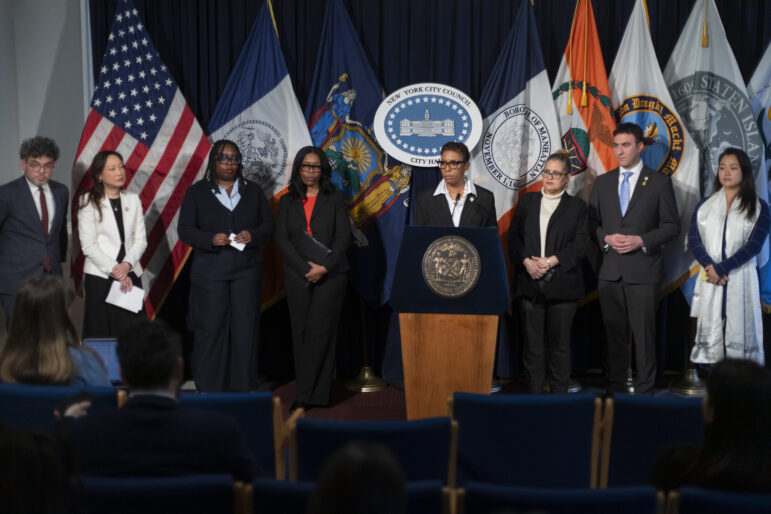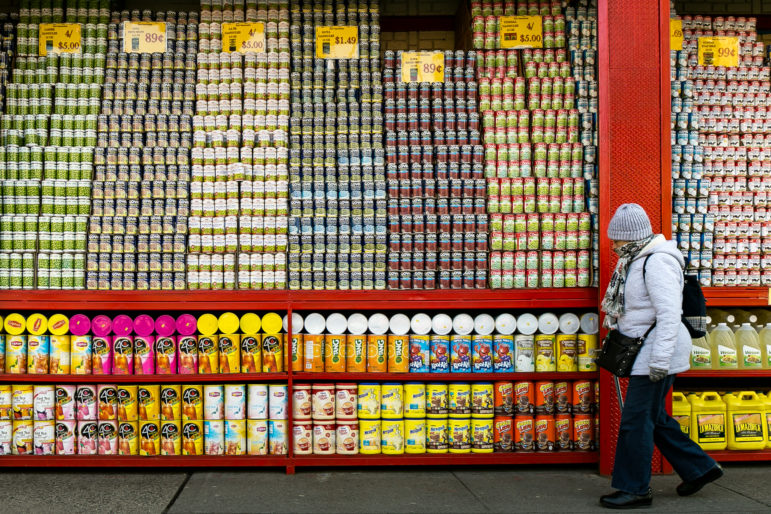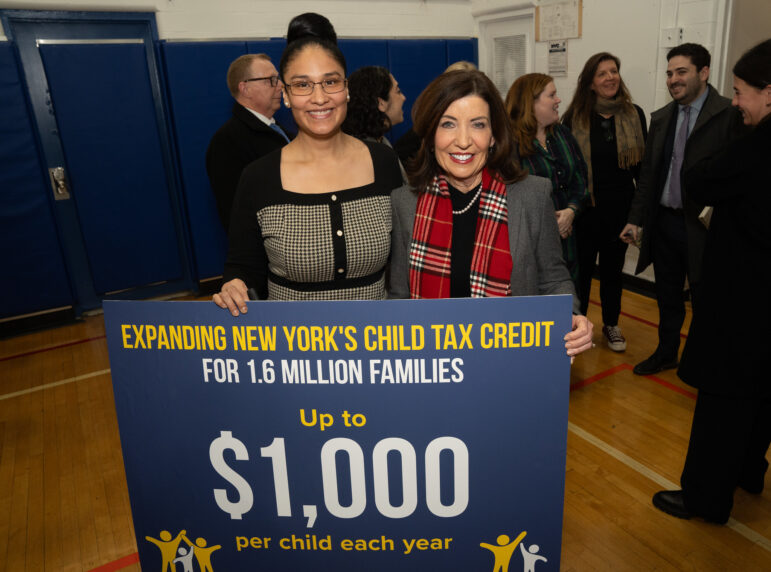Repairs for the Gowanus Houses and Wyckoff Gardens—pledged as part of negotiations to pass a wider neighborhood rezoning in 2021—are moving forward, as NYCHA selects a development team to take on the fixes.
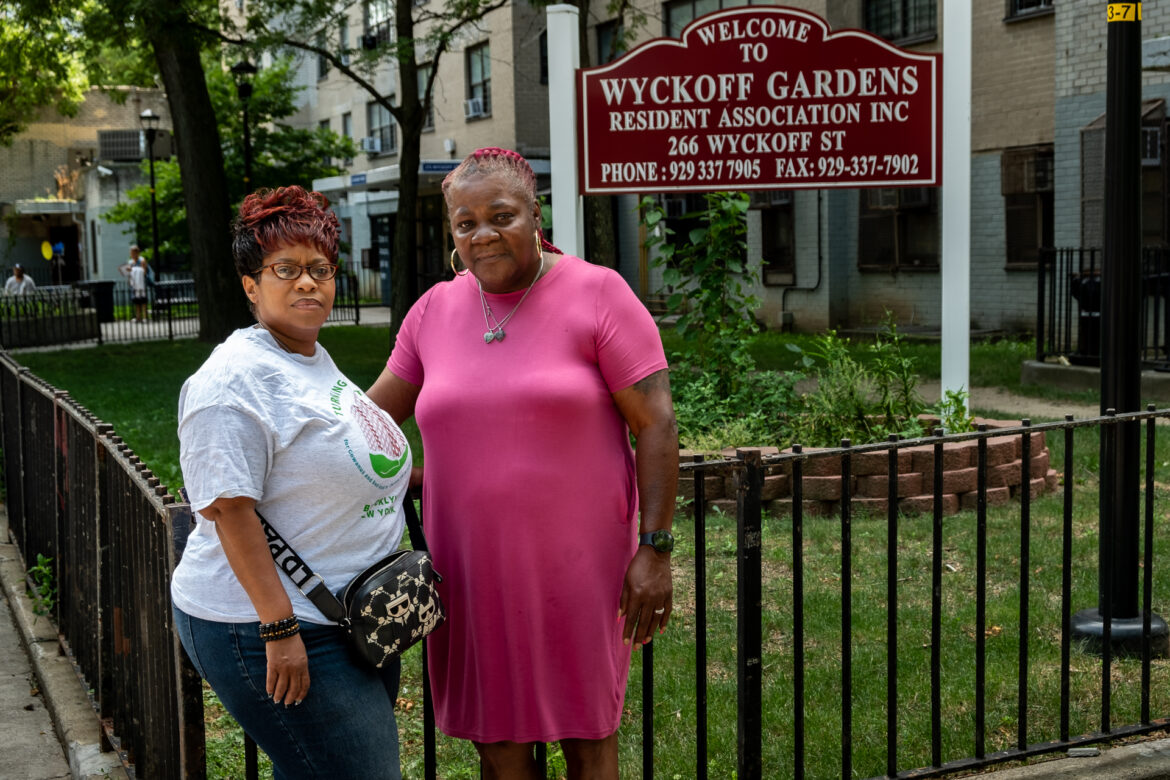
Adi Talwar
Theresa Davis and Valerie Bell, the Tenant Association presidents at NYCHA’s Gowanus Houses and Wyckoff Gardens.NYCHA’s Gowanus Houses and Wyckoff Gardens developments in Brooklyn’s Boerum Hill neighborhood are surrounded by signs of transformation.
Between Nevins and Butler streets, cranes tower over rubble that in three years will become the Gowanus Canal Combined Sewer Overflow Facilities, equipped with water retention tanks—part of long-term remediation plans to prevent the polluted waterway from flooding—and a public park.
On Dean Street, a 17-story luxury apartment building with 36 units reserved for housing lottery winners is a new addition to the community. And on the corner of Smith and 5th streets, Gowanus Green—six residential buildings slated to include roughly 950 affordable housing units—will rise by 2027.
These projects are part of the Gowanus rezoning plan, which the City Council approved in 2021. Spanning 82 blocks, the rezoning aims to spur an estimated 8,500 new apartments—3,000 of them affordable housing.
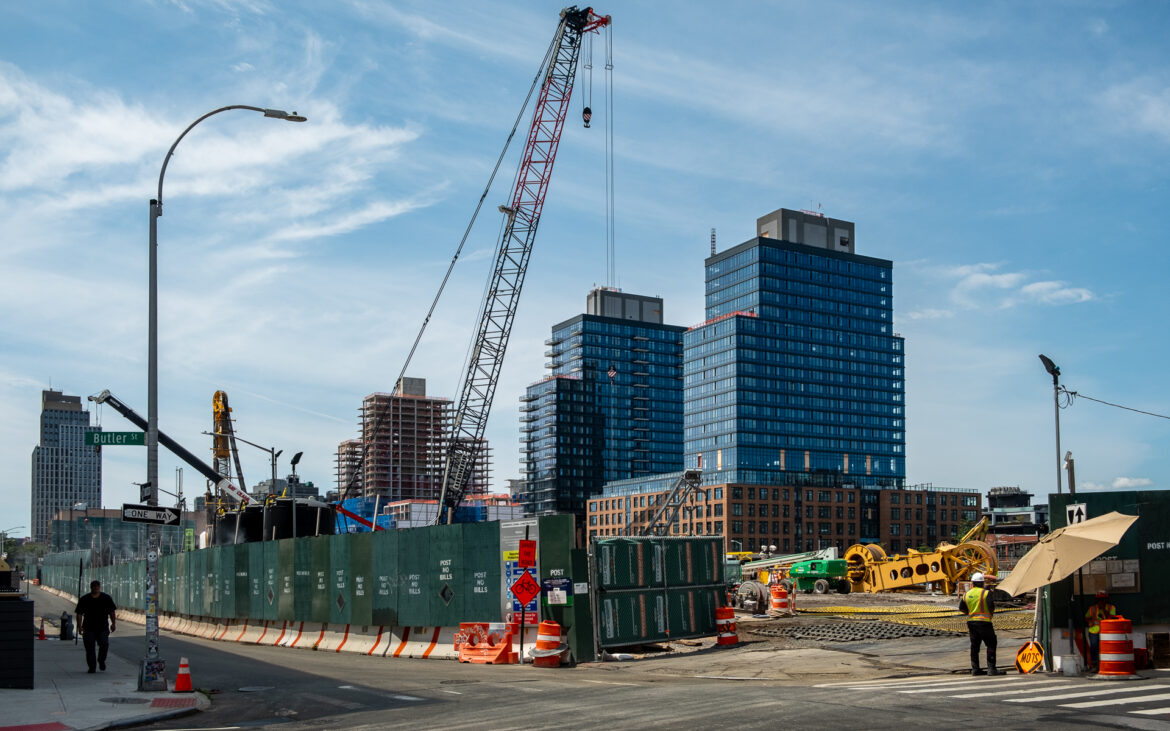
Adi Talwar
Construction at the intersection of Nevins and Butler streets in the Gowanus neighborhood of Brooklyn.Also included in the neighborhood rezoning was funding toward rehabilitating the area’s public housing developments.
Investment in existing buildings is important for residents like Michael McClain, who has lived at Gowanus Houses since 1975. Despite the new construction happening around him, he told City Limits he prefers living in the mid-rise brick building he’s called home for nearly five decades.
“These buildings were made to last,” McClain said.
Pledged investments in the area’s two NYCHA campuses were a key part of negotiations in passing the wider Gowanus neighborhood rezoning.
During a 2021 gathering at Gowanus Houses, then-mayoral candidate Eric Adams, serving as Brooklyn borough president at the time, backed the rezoning plan but emphasized that “buildings cannot go up around NYCHA developments while residents see their futures go down,” City Limits reported at the time.
In 2022, the city earmarked $200 million for NYCHA repairs as part of the rezoning deal, including new windows, kitchens and bathrooms across the 15 buildings at Gowanus Houses and three buildings in Wyckoff Gardens. The two developments are home to more than 3,700 tenants, according to NYCHA.
Last July, NYCHA issued a Request for Qualifications (RFQ) for firms to submit proposals for the design and construction process.
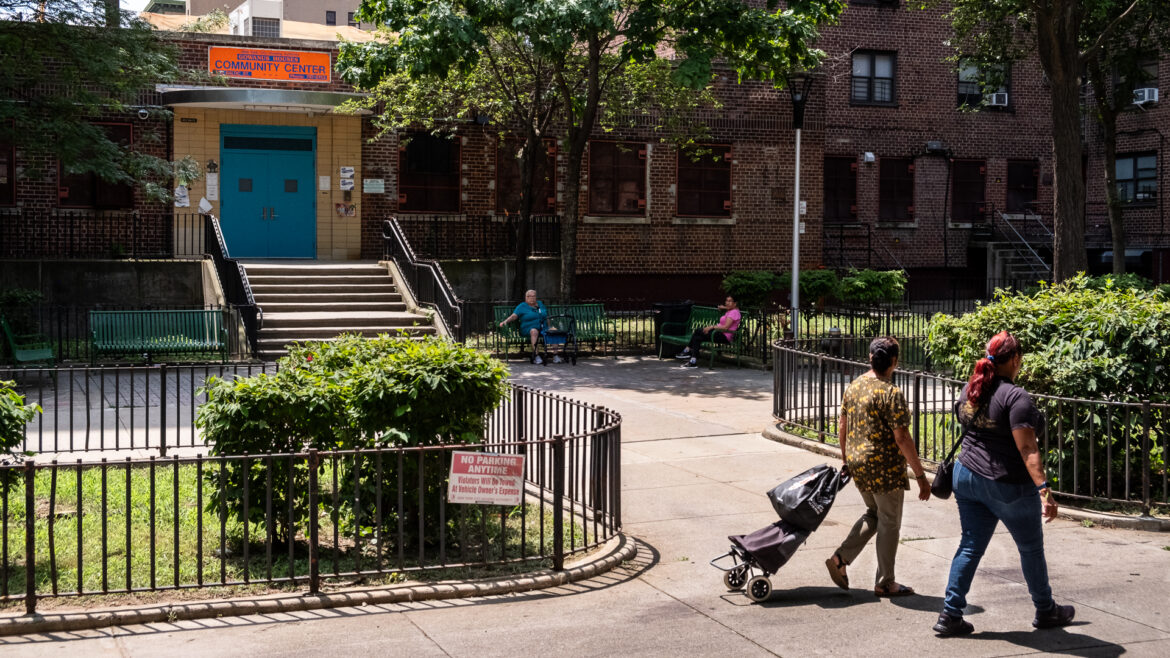
Adi Talwar
NYCHA’s Gowanus Houses on July 26, 2024.Two weeks ago, the housing authority announced its decision, hiring Mega/Technico Joint Venture—a partnership between two companies, Mega Development, LLC and Technico Construction Services, Inc.—to do $216 million worth of repairs for both developments.
The firm has already worked with NYCHA in various capacities, such as Hurricane Sandy repairs and renovations through the Permanent Affordability Commitment Together (PACT) program, according to NYCHA.
PACT, introduced to the city in 2016, is the local version of a nationwide program called the Rental Assistance Demonstration (RAD), which allows public housing authorities to be managed by private companies in an effort to invest and rehabilitate aging properties.
Another funding model signed into law in 2022 is the Public Housing Preservation Trust, which taps into funds outside of the federal Section 9 program, such as bonds and mortgages, to pay for repairs. Since last year, NYCHA has allowed tenants at select campuses to vote on which model they want; one such vote is currently underway at Coney Island Houses and Unity Towers in South Brooklyn.
Although the renovations in Gowanus mirror the scope of work being done at developments under PACT and the Trust, those initiatives convert NYCHA properties from Section 9 to Section 8, another federal program, which can unlock funds from alternative sources.
Some residents have opposed that switch, pushing to keep NYCHA campuses in Section 9 and for both the federal and local governments to better fund the traditional public housing program.
By contrast, Gowanus and Wyckoff Gardens Houses are still part of Section 9, and will be funded through an initiative NYCHA introduced in 2021 called the Comprehensive Modernization Program.
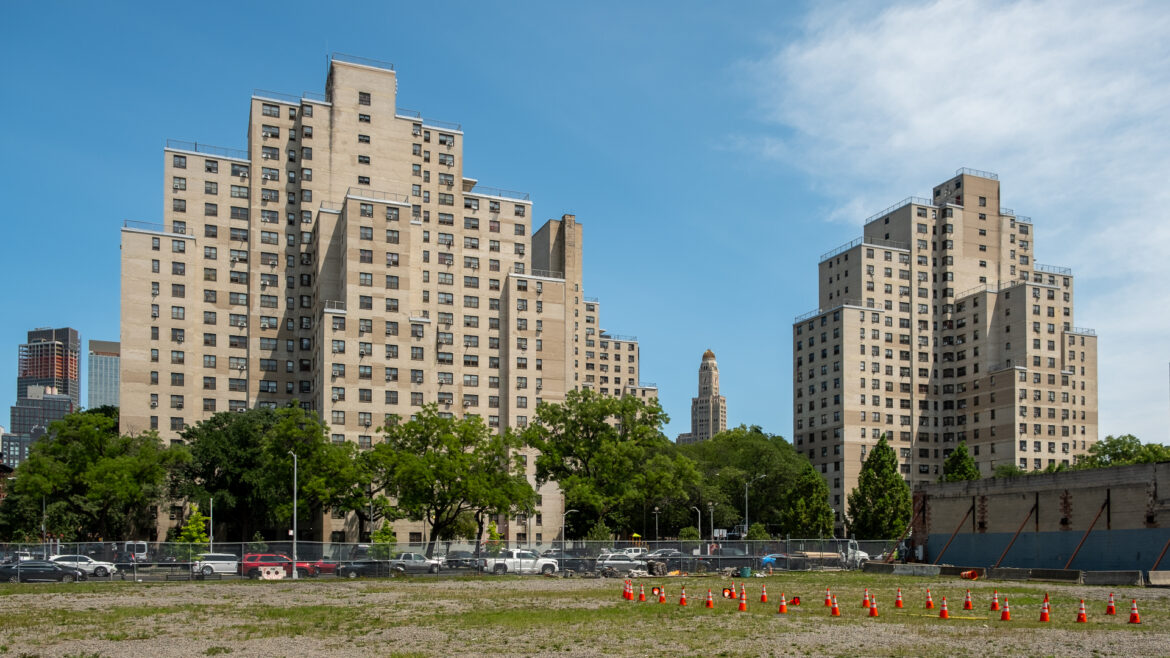
Adi Talwar
A view of NYCHA’s Wyckoff Gardens from the intersection of Butler and Nevins streets.The Comp Mod program results from the January 2019 agreement NYCHA struck with the U.S. Department of Housing and Urban Development to rehabilitate public housing properties that are in poor condition. The housing authority needs an estimated $78 billion in repairs over the next two decades.
So far, two other developments are part of the “comp mod” program: St. Nicholas Houses in Harlem and Todt Hill in the Manor Heights section of Staten Island.
The goal of Comp Mod is to “effectively utilize available capital funding for a property to holistically rehabilitate the campus and buildings,” according to NYCHA, with the program’s plans totaling $1 billion.
Theresa Davis, the tenant association president of Gowanus Houses, told City Limits that the Mega/Technico Joint Venture team has engaged with residents through regular meetings and by providing walkthroughs of the repair process.
“When you include the tenants, they feel safer,” said Davis. “They can say, ‘I had a part to do with that in my development.’”
She added that tenants are ready to “finally” get work done in their apartments.
“To see new cabinets because they’re breaking down, to get new floors and tiles, especially the bathroom, oh lord…” said Davis. “In our development we always get mold, mildew, and they’ll clean it and have to come back again and again.”
As a precaution, NYCHA is preparing for residents to temporarily relocate for approximately one month during construction, to avoid potential exposure to toxins while doing things like removing lead paint. Impacted residents will stay at nearby hotels without cost to tenants, the housing authority said.
Valerie Bell, the tenant association president at Wyckoff Gardens, said that outside of apartment renovations, she hopes to see more security measures put in place at Wyckoff Gardens, to prevent trespassers from sleeping in the buildings’ stairwells
“That’s a big need,” said Bell. “I know it’s going to be hard.”
But in general, she was happy with how plans are progressing so far.
“Whoever came up with the idea of forming Comp Mod came up with a brilliant idea,” said Bell. “This is the most transparent I’ve ever seen NYCHA.”
NYCHA estimates the construction will take between three to four and a half years, and is expected to begin in 2025.
To reach the reporter behind this story, contact Tatyana@citylimits.org. To reach the editor, contact Jeanmarie@citylimits.org
Want to republish this story? Find City Limits’ reprint policy here.


